Every rep you lift, every step you walk or run, every foot of elevation you climb is powered by your heart – your heart's ability to pump blood efficiently is what makes all athletic performance possible.
Heart health supplements are kind of a neglected product category. We don't see new entries in this category very often, and for some reason we haven't quite figured out, the entries we do see are typically not very impressive on the formulation side.
That is not the case with Core Nutritionals HEART.
Core HEART is part of Core's Lifeline product series – these supplements consist of serious health and organ-centric formulas that address numerous issues targeting specific health concerns.
Not surprising for a company run by founder and CEO Doug Miller, who's really put an incredible emphasis on health alongside his bodybuilding endeavors.
Core HEART arrived at the end of 2021, but we had never written about it, and it's too good of a cardiovascular health formula to ignore. Let's get into how this works, but first, check PricePlow's coupon-powered deals and sign up for our Core Nutritionals news alerts:
Core Nutritionals HEART – Deals and Price Drop Alerts
Get Price Alerts
No spam, no scams.
Disclosure: PricePlow relies on pricing from stores with which we have a business relationship. We work hard to keep pricing current, but you may find a better offer.
Posts are sponsored in part by the retailers and/or brands listed on this page.
Core HEART Ingredients
In a single, 6 capsule serving of Heart from Core Nutritionals, you get the following:
-
Zinc (as Zinc Bisglycinate Chelate TRAACS) – 30 mg (272% DV)
The mineral zinc plays a crucial role in immune response, cellular metabolism, DNA production, protein synthesis, and cellular replication.[1]
Zinc is also famous for its androgenic effects. Thanks to its powerful ability to optimize testosterone production, zinc is one of the go-to low-cost, low-risk supplements for anyone who wants to gather up some low-hanging gains.[2]
We love seeing the TRAACs chelated form of zinc being used, as it's highly bioavailable compared to other common forms of zinc on the supplement market.[3]
Why is zinc in a heart health formula?
Less well known is that zinc is a biomarker of cardiac health[4] – severe zinc deficiencies have even been identified as a reversible cause of heart failure.[5]
While the PricePlow Blog writing staff doesn't generally like to throw huge block quotes at our readers, this excerpt from a study on zinc and cardiac health is such a tour de force of a research summary that we think it'd be wrong not to share:
"Deficiency of Zn leads to apoptosis, inflammation, and oxidative stress, all well-acknowledged risk factors for the development of CVDs. Perturbations in Zn homeostasis affect the vascular endothelium. Zn deficiency weakens vascular health, impairs appropriate fatty acid and carbohydrate metabolism, and negatively impacts the cell structure of the aorta. Impaired Zn homeostasis is associated with common genomic and proteomic modifications that relate to CVDs. Zn controls the arteriosclerotic process, and inadequate Zn intake leads to increased oxidative stress, disrupted nitric oxide (NO), and nuclear factor kappa-light-chain-enhancer of activated B-cell (NF-kB) signaling and contributes considerably to endothelial damage and development of arteriosclerosis (ARS). The rate of ARS, ischemic injuries, ischemic CM, and ischemic HF amplifies in line with decreasing plasma Zn levels. Likewise, dietary Zn intake and Zn deficiency are adversely linked to subclinical ARS as demonstrated through carotid intima-media thickness. Heart development is sensitive to Zn deficiency, and maternal Zn deficiency is linked to a high incidence of fetal heart abnormalities. Furthermore, Zn inadequacy prevents adequate development of cardiac tissues and increases blood pressure in fetuses and infants. Excessive embryonic cell death occurs after episodes of Zn deficiency. Proatherogenic factors, released during Zn deficiency, increase the incidence of arrhythmias, strokes, CM, and many other CV system pathologies. There is an inverse relation between the serum Zn concentrations and the risk of CVDs in high-risk populations. Besides, lower serum Zn levels are associated with a higher risk of CVDs, with the greatest relations reported in most vulnerable populations, i.e., patients with diabetes and coronary angiography. Stimulated expression of inflammatory cytokines, i.e., interleukin 6 (IL-6), interleukin 2 (IL-2), interleukin 1 beta (IL-1β), tumor necrosis factor alpha (TNF-α), and increased oxidative stress are aggravated under Zn deficiency conditions. Similarly, cytokines can upregulate or downregulate the expression of particular cellular Zn transporters. Twenty-four Zn transporters are found within the human heart muscle tissue, so disturbances in Zn homeostasis may lead to CVDs. Turbulences in Zn homeostasis contribute to the development of hypertension (HT). Through the renin-angiotensin-aldosterone system, Zn regulates arterial pressure and plays an important role in the etiopathogenesis of arterial HT."[4]
As you can see, if preserving your long-term heart health is the goal, zinc is a mineral you definitely don't want to be deficient in.
Ultimately, we recommend ~30mg high-quality zinc to nearly everyone (unless blood and hair tests indicate otherwise). Now we have one more reason to use it... and with HEART, you don't need to buy a separate zinc supplement, so the effective price of Core HEART just became lower.
-
Vitamin K2 (as MenaQ7, Menaquinone-7) – 180 mcg (150% DV)
Vitamin K, a fat-soluble vitamin found in green leafy vegetables, fish, liver, and eggs, acts as a cofactor for post-translational γ-carboxylation of vitamin K-dependent proteins (VKDP).[6] Insufficient intake of vitamin K can negatively impact VKDP functions, such as proteins C, S, and Z, which are involved in blood coagulation and cardiovascular health.[6]
CORE Longevity is a comprehensive mitochondrial health support supplement that's the first to use NNB Nutrition's Puremidine spermidine - with BioNMN!
Vitamin K2 supplementation can support arterial health by inhibiting arterial calcification and stiffness.[6,7] Additionally, adequate vitamin K2 intake is associated with reduced vascular damage and improved bone health.[7]
Core Nutritionals Heart utilizes the menaquinone-7 (MK-7) of vitamin K2 because MK-7 is known for its higher bioavailability and longer half-life.
We always suggest Vitamin K2 alongside Vitamin D (which is next), since vitamin D on its own can lead to calcification.[8] So this is a great formulation to see.
-
Vitamin D3 (as Cholecalciferol) – 25 mcg (125% DV)
Vitamin D is crucial for maintaining optimal health, but unfortunately, a significant portion of the population — particularly middle-aged and older Americans — are vitamin D deficient. High risk categories include the elderly, Blacks, and obese individuals.[9]
Vitamin D deficiency has been associated with various health conditions, including obesity, depression, hypertension, osteoporosis, neurodegenerative diseases, chronic fatigue syndrome, cancer, heart disease, and stroke.[9,10]
While its role in promoting bone health and calcium absorption is well-known, vitamin D also shows potential in reducing the risk of cardiovascular disease (CVD) through mechanisms such as inflammation inhibition, regulation of blood sugar metabolism, blood pressure, and vascular calcification.[9]
Again, it's important to see Vitamin K2 paired next to this, so CORE is doing the right things.
-
Hawthorne Berry Extract (Crataegus oxyacantha) (fruit) (4:1) – 1,000 mg
Hawthorne berry (sometimes also spelled hawthorn) has long been used in traditional Chinese medicine (TCM) to help manage high blood pressure[11] and other cardiovascular ailments.
Modern scientific research has recently lent credence to hawthorne's ability to improve cardiovascular health. One double-blind, randomized, placebo-controlled study concluded that congestive heart failure (CHF) patients who were supplemented with hawthorne extract performed significantly better on an exercise test than CHF patients in the placebo group[12] – their average power output was about 8 watts higher. That's a pretty big difference – even professional endurance athletes would be pleased with an 8 watt improvement in their functional power threshold.
Another study found that hawthorn can prevent treatment with a cardiac toxin from inducing arrhythmias in rats.[13] According to this study, hawthorn also reduces blood pressure so effectively that its hypotensive effect should be considered a factor in clinical settings, lest patients' blood pressure get dropped too low.
Hawthorn's primary mechanism of action seems to be nitric oxide (NO) upregulation and endothelial protection, but it also has antioxidant, anti-inflammatory, and anti-hyperlipidemic properties.[14]
-
Olive Extract (Olea europaea) (leaf) (20% Oleuropein) – 1,000 mg
One of the unsung heroes in Core HEART, this is one of those "swiss Army knife" ingredients that can have tremendous benefits across a spectrum of health concerns. Olive leaf extract has been used traditionally to manage conditions like high blood pressure, diabetes, gout, fever, and rheumatism.[15]
Olive Leaf Extract brings a ton of benefits and is extremely popular for its weight loss and thyroid function benefits... but don't forget about immunity as well!
Once again, modern scientific research has vindicated traditional wisdom, showing that oleuropein and other phenolic compounds in olives can indeed help reduce blood pressure, improve cholesterol, and manage the body's glycemic response.[15]
So how much can olive leaf extract help? According to one 2021 meta-analysis, 500 milligrams of olive leaf extract daily – just half the dose used in Core Nutritionals Heart – can reduce systolic blood pressure by over 5 mmHg, on average.[16]
Worth noting, olive leaf has also shown significant antimicrobial, anti-inflammatory, and antioxidant effects.[15] In the past, we've written about its incredible immunity effects, including potent antiviral effects (see the OLE section of our hypothetical immunity supplement formulation), so paired with the zinc in here, it turns out that Core HEART can provide a nice immunity boost too!
-
Red Yeast Rice (Monascus purpureus) – 600 mg
Red yeast rice is another great anti-hyperlipidemic agent – it helps keep blood cholesterol under control.[17] In fact, red yeast rice is so good at this that one peer-reviewed study calls its extract "the most effective cholesterol-lowering nutraceutical on the market."[17]
The primary bioactive constituent of red yeast rice, monacolin K, has the same chemical structure as lovastatin, a pharmaceutical drug that belongs to the famous statin category.[17]
In 600 milligrams of red yeast rice extract, we should expect to see roughly 9 milligrams of monacolin K.[17] Doses in this range have been shown to reduce low-density lipoprotein (LDL) cholesterol by 15%-25% when taken daily for 6 to 8 weeks.[17]
The necessary disclaimer here is that the monacolin K content of red yeast extract does vary, and we don't know exactly how much monacolin K is present in the extract used for Core Nutritionals Heart because it isn't disclosed on the label. But according to red yeast rice meta-analysis we've cited as reference 27, the 3 milligrams monacolin K per 200 milligrams red yeast rice extract is actually on the lower side of what the authors reviewed.[17]
Red yeast extract has also been shown to have positive effects on apolipoprotein B, triglycerides, HDL-C, flow-mediated dilation, and pulse wave velocity.[17]
-
Bergamot Fruit Extract (Citrus aurantium bergamia) (30% Polyphenols) – 500 mg
Bergamot is a variety of the orange fruit. Extracts of bergamot have been shown to possess pro-immunity and cardioprotective properties, thanks to their high content of flavonoids and other phytochemicals like glucosides, melitidin, neoeriocitrin, neohesperidin, rutin, brutieridin, and naringin. These are bioactive constituents with anti-inflammatory, antioxidant, and anti-hyperlipidemic properties.[18]
There's far more bergamot research studies than you'd expect, and nearly all of it has some kind of positive outcome![19]
Bergamot has been used in traditional medicine to manage fever, sore throat, and mild infection.[18]
The flavonoids in bergamot are what give the fruit most of its anti-hyperlipidemic power., As a result, bergamot has been shown to reduce LDL (bad cholesterol) and total cholesterol, while increasing HDL (good cholesterol) levels.[18]
As we've written in the past, the combination of high HDL and low triglycerides is a much better marker of cardiovascular health than low LDL alone.[20-24] There are not many compounds that can safely increase HDL cholesterol – bergamot is one of them.
The mechanism of action behind bergamot's effects appears to be AMPK upregulation and pancreatic cholesterol ester hydrolase (pCEH) inhibition,[25] but research on this topic is still in its infancy.
-
Curcumin (Curcuma longa) (root) (95% Curcuminoids) – 500 mg
Curcumin is the primary bioactive constituent of turmeric, a yellow-orange spice related to ginger that most readers are probably familiar with. Turmeric has been used for hundreds, if not thousands, of years to manage a wide variety of conditions, in both traditional Chinese medicine (TCM) and Ayurvedic medicine.[26,27]
Extracts of turmeric are basically always standardized for curcumin and the closely related curcuminoids, thanks to the curcuminoids' impressive ability to fight inflammation and microbial infection.[28-30]
Although curcumin usually gets more attention for its anti-inflammatory properties – which are important, to be sure – we want to emphasize its effect on the human immune system. Research shows that physiologically-dosed curcumin can improve the function of T cells, B cells, macrophages, neutrophils, NK cells, and dendritic cells.[26,27]
The laundry list of symptoms that curcumin has been shown to help manage in clinical settings reads like a "Who's Who?" for the so-called diseases of civilization. Everything from cancer to depression to diabetes appears to be positively impacted in some way by curcumin.[28,30]
No surprise, then, that one peer-reviewed study refers to curcumin as a "nature-made Jack-of-all-trades."[30]
-
Polygonum Cuspidatum Extract (root) (50% trans-Resveratrol) – 500 mg
Japanese knotweed, also known as Polygonum cuspidatum, is naturally rich in resveratrol, a polyphenol that upregulates an enzyme called sirtuin 1 (SIRT1).[31]
SIRT1 is active in your cells' nuclei, and regulates cell proliferation, apoptosis (programmed cell death), insulin signaling, and stress.[32] One of SIRT1's most important roles is protecting your DNA from oxidative stress damage.[33]
Partly through its impact on SIRT1, resveratrol can also improve blood cholesterol levels.[34] Importantly, resveratrol can also prevent the oxidation of LDL cholesterol (bad cholesterol), which helps discourage the formation of plaque in your arteries.[35,36] Resveratrol's effects on cholesterol profiles have been observed in randomized, double-blind, placebo-controlled studies on human subjects.[37]
-
Coenzyme Q10 (Ubidecarenone) – 100 mg
Coenzyme Q10 is an antioxidant that helps optimize mitochondrial function.
Here's a unique stack for heart health -- add Core Nutritionals PEAK, an awesome stim-free nitric oxide booster for powerful pumps.
Since your mitochondria make all your body's energy in the form of adenosine triphosphate (ATP), it probably won't come as a shock to hear that CoQ10 deficiency is implicated in major illnesses like diabetes, cancer, neurological disorders, and cardiovascular disease.[17]
CoQ10 can play an important role in cardiovascular health, thanks to its ability to stabilize nitric oxide (NO) and promote vasodilation.[38] This helps keep blood pressure and heart rate from rising too high.[38]
Besides improving circulation, CoQ10 can also improve cardiac function, and increase your serum levels of HDL cholesterol.[39-41]
-
Bioperine (Black Pepper Extract) (std to 95% Piperine) – 10 mg
Piperine, the bioactive constituent of the BioPerine black pepper extract, helps inhibit certain stomach enzymes that can prematurely break down nutrients. By preventing that breakdown from occurring, piperine enables those nutrients to pass through your stomach intact so they can be absorbed into your bloodstream.[42]
Piperine can also improve insulin sensitivity by upregulating glucose transporter 4 (GLUT4)[43] and reducing liver fat while fighting oxidative stress.[44,45]
Dosage and Directions
Per the bottle, take 6 capsules daily with or without food. You can split this into an AM/PM regimen with 3 capsules twice daily.
In terms of stacking, there are several possibilities within the rest of the CORE Lifeline series and the rest of their supplements -- we just suggest not going too much higher in zinc unless your lab tests (hair and blood) indicate that you should do so.
Conclusion: Core HEART Does a Lot... and More
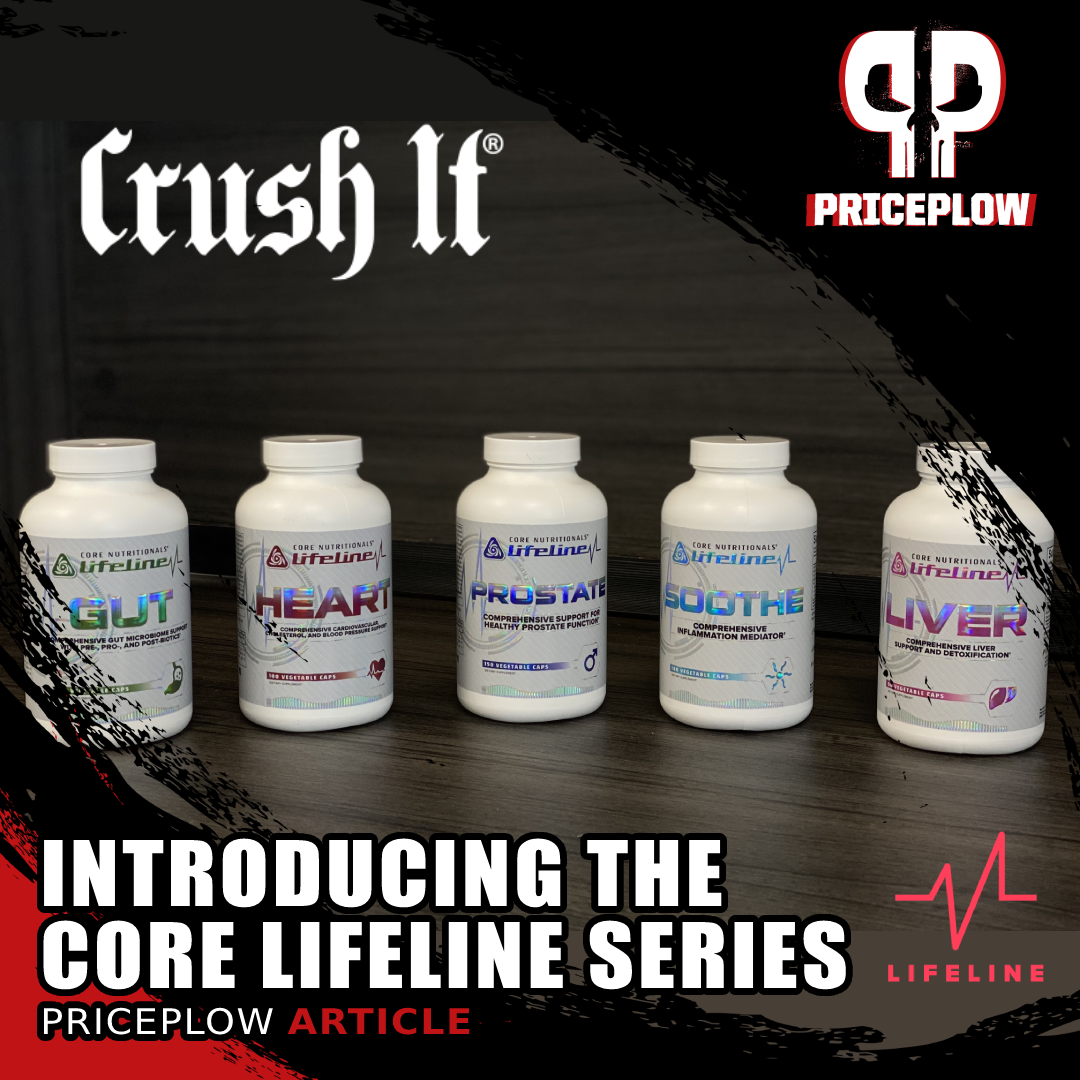
Introducing the Core Lifeline series! With Doug Miller at the helm, this is an unsurprising move -- but wait until you see the dosages in these supplements!
We like products that cover the basics with a nuanced selection of specialized ingredients. That's the exact design philosophy evinced by Core Nutritionals Heart. We love the emphasis on supporting NO activity to reduce heart rate and blood pressure, but when it comes to the long-term effectiveness of Core Nutritionals Heart, the MK-7 vitamin K2 is doing most of the heavy lifting.
Further, the zinc and olive leaf extract are two immune-system boosting supplements that we encourage nearly everyone to take -- the fact that they're already in Core HEART brings the effective price tag down, since you have two fewer things to worry about taking now!
Check out more of Core's Lifeline series to further optimize your body's health.
Core Nutritionals HEART – Deals and Price Drop Alerts
Get Price Alerts
No spam, no scams.
Disclosure: PricePlow relies on pricing from stores with which we have a business relationship. We work hard to keep pricing current, but you may find a better offer.
Posts are sponsored in part by the retailers and/or brands listed on this page.
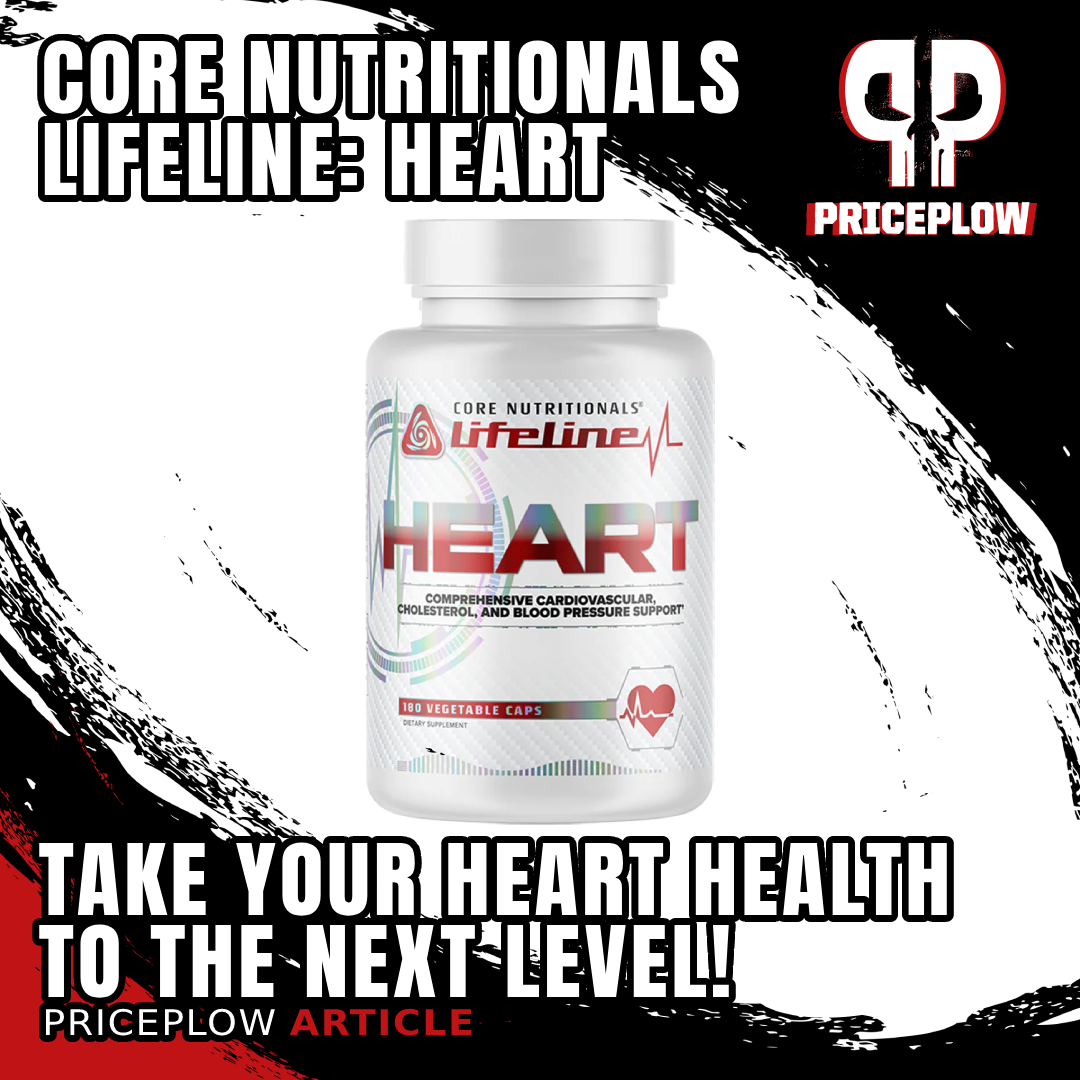
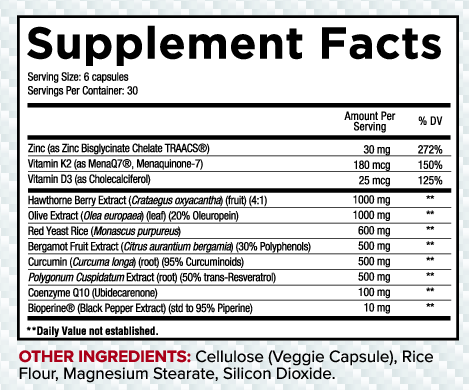
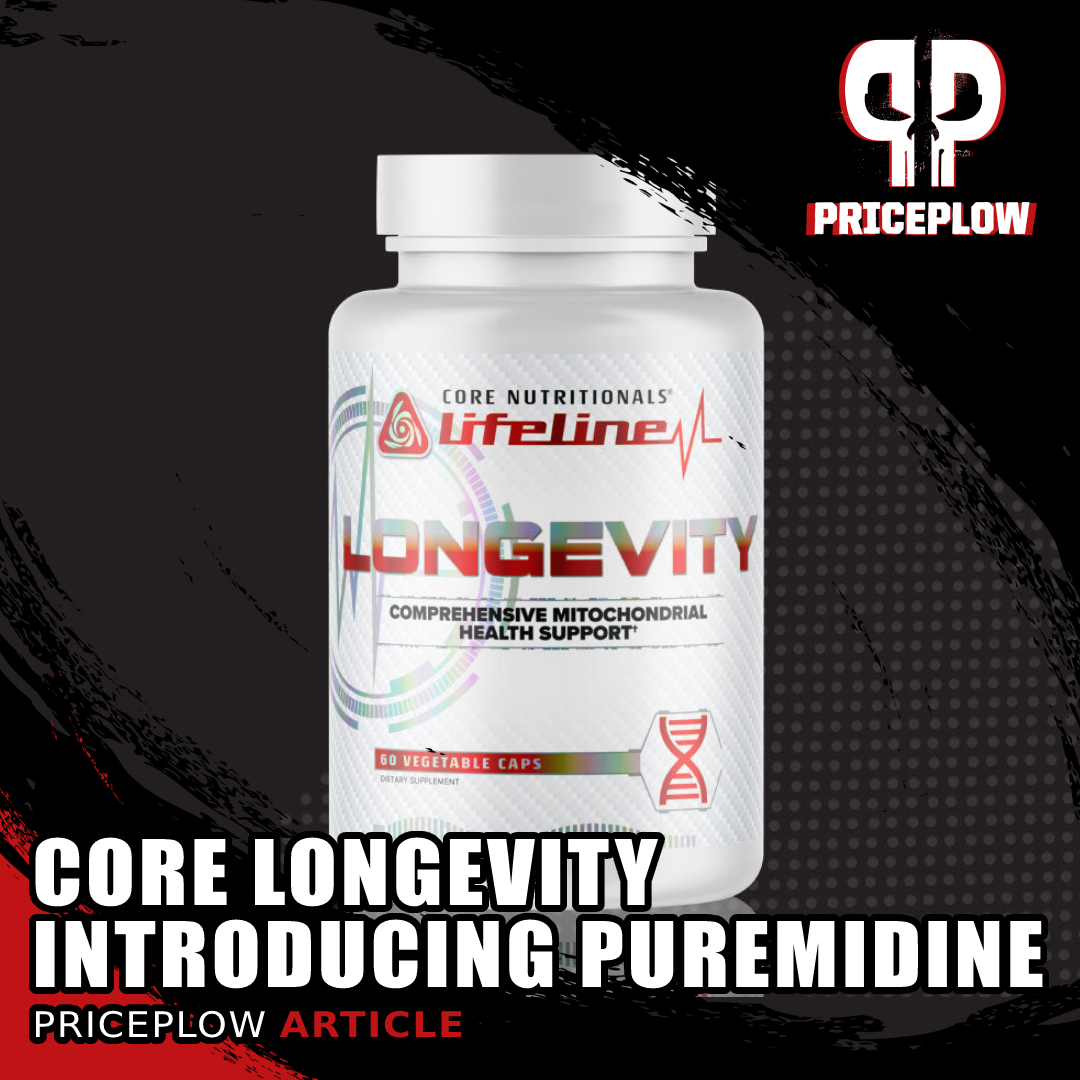


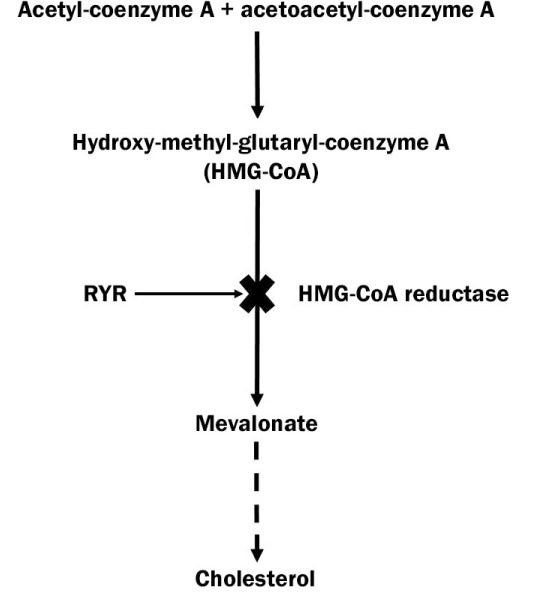
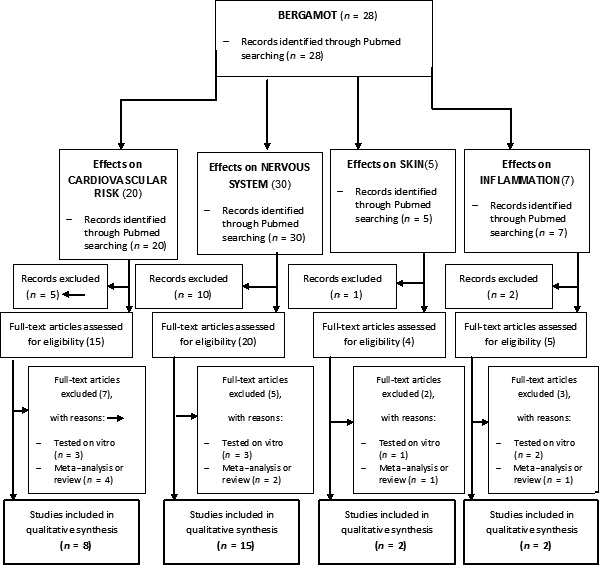

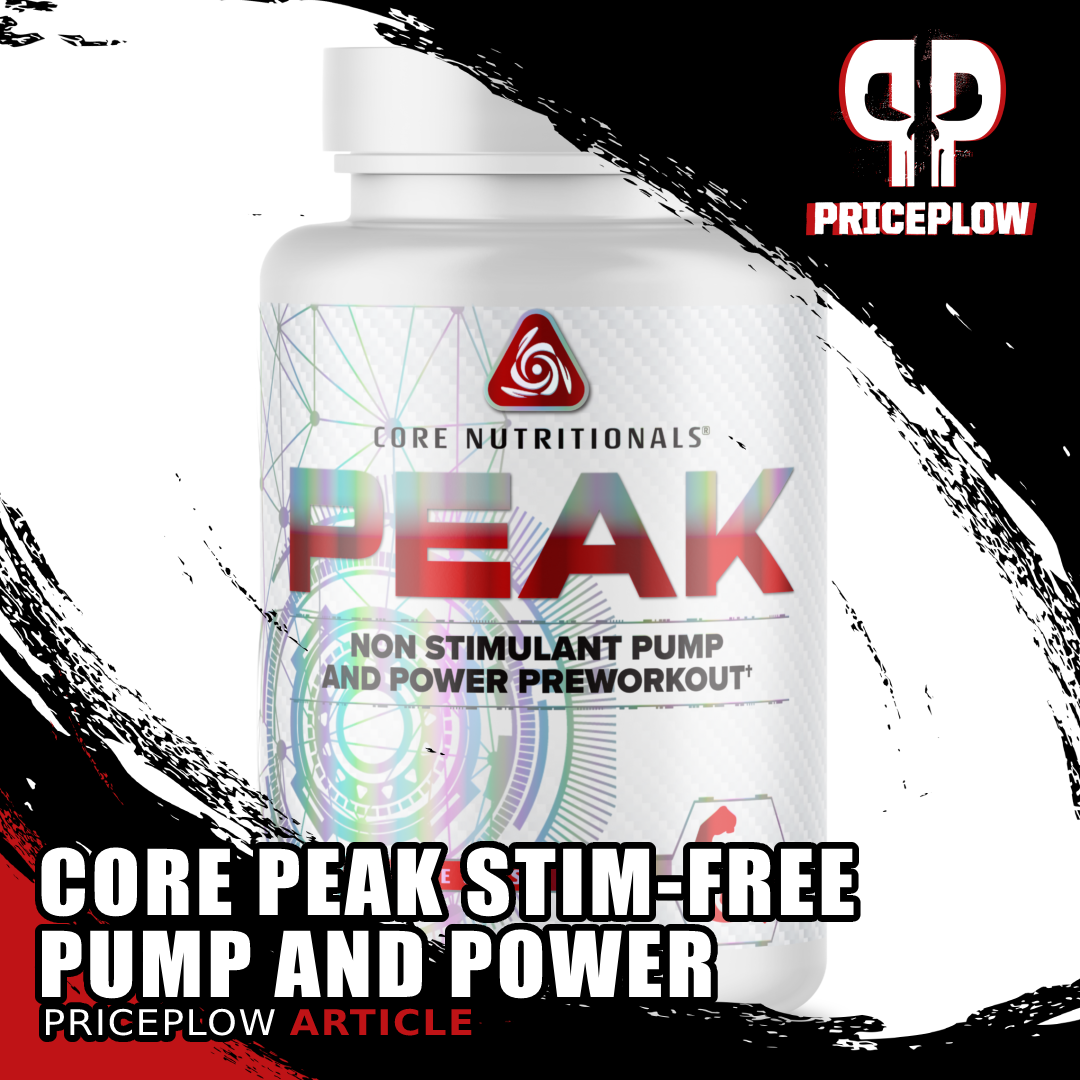


Comments and Discussion (Powered by the PricePlow Forum)